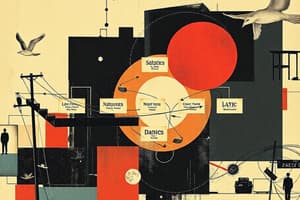Podcast
Questions and Answers
What is organisation primarily considered in management?
What is organisation primarily considered in management?
- A static concept
- An informal arrangement
- A mechanism for direction and control (correct)
- A chart
Organisation structure consists of a network of vertical authority relationships only.
Organisation structure consists of a network of vertical authority relationships only.
False (B)
What are the two dimensions of organisation structure?
What are the two dimensions of organisation structure?
Horizontal and vertical
What does the horizontal dimension of organisation structure depict?
What does the horizontal dimension of organisation structure depict?
According to Allen, what is the process of organising?
According to Allen, what is the process of organising?
Organising is a static process in management.
Organising is a static process in management.
Organising results in an organisation _____ .
Organising results in an organisation _____ .
What is a key characteristic of the organising process?
What is a key characteristic of the organising process?
Flashcards are hidden until you start studying
Study Notes
Nature of Organising
- Organisation serves as a mechanism for management to direct, coordinate, and control business activities.
- A well-designed organisation plan is crucial for effective management; an ill-structured one hampers performance.
- Organisation defines authority relationships within a group aimed at achieving common objectives.
Organisation Structure
- Organisation as a structure encompasses the network of horizontal and vertical authority relationships among members.
- It includes a social group and a structured framework that allows interaction and cooperation towards shared goals.
- The structural framework is two-dimensional:
- Horizontal Dimension: Represents job differentiation into departments or divisions.
- Vertical Dimension: Indicates the hierarchy of authority, showcasing levels from top management to lower levels.
Characteristics of Organisation Structure
- Formal relationships dictate how individuals work together to reach desired objectives.
- The framework consists of duties, responsibilities, accountability, and authority channels.
- The organisational structure is often visually depicted in organisational charts.
Organising Process
- Organising is a continuous and dynamic function of management that creates authority-responsibility relationships among specialised units.
- It involves:
- Identifying and grouping work tasks.
- Defining and delegating responsibility and authority.
- Establishing relationships for effective teamwork.
- According to management theorists, organising leads to an intentional role structure that supports enterprise objectives.
Importance of Organising
- The organising function ensures activities are effectively departmentalised, assigned, and coordinated.
- The output of the organising process is the organisational structure, reflecting the established patterns and relationships.
Nature and Characteristics of Organisation
- Organisation is characterized by a structured process for individuals to interact and achieve predetermined objectives.
- The concepts of organisation structure and organising process are interdependent and complement each other in effective management.
Studying That Suits You
Use AI to generate personalized quizzes and flashcards to suit your learning preferences.




